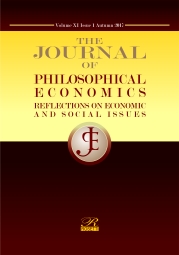The welfare costs of rent-seeking:
a methodologically individualist and subjectivist revision
The welfare costs of rent-seeking:
a methodologically individualist and subjectivist revision
Author(s): Michael MakoviSubject(s): Philosophy, Social Sciences, Economy, Special Branches of Philosophy, Sociology, Philosophy of Science, Social Theory, Socio-Economic Research
Published by: Editura Rosetti International
Keywords: Tullock; rent-seeking; interest groups; efficiency; subjectivism; methodology;
Summary/Abstract: Gordon Tullock is acknowledged for being the first to recognize the true costs of rent-seeking as including not only the Harberger triangle but also the Tullock rectangle. This rectangle does not constitute merely a lossless transfer of wealth, but it causes a misallocation of resources as rent-seekers invest resources in lobbying. However, a close reading of Tullock’s writings shows that his arguments are formulated in a holistic fashion, speaking of what is efficient or inefficient for society. Rent-seeking is inefficient because it reduces societal welfare. But according to a methodologically individualist and subjectivist economics, such a claim is invalid. We must distinguish between positive economic fact and normative moral philosophy. We call for a reconstruction of utility and welfare economics based on methodological individualism and subjectivism with implications for the theories of monopoly and competition: practices which Neoclassical perfect-competition theory considers to be evidence of rent-seeking should instead be deemed as indications of genuine competition Political economy should be concerned with ascertaining which institutions will best enable individuals to pursue their individually subjective ends – or else economists should be explicit about their normative preferences and political philosophies.
Journal: Journal of Philosophical Economics
- Issue Year: IX/2015
- Issue No: 1
- Page Range: 73-101
- Page Count: 30
- Language: English

